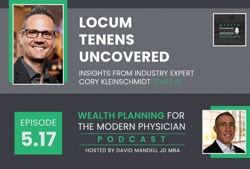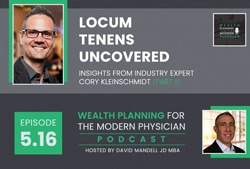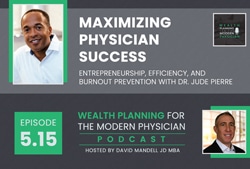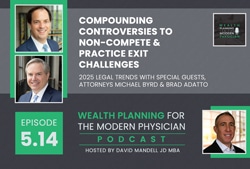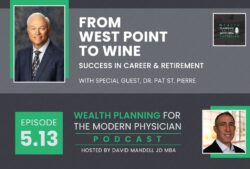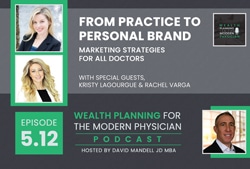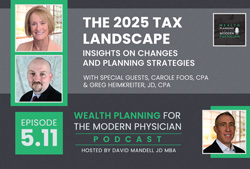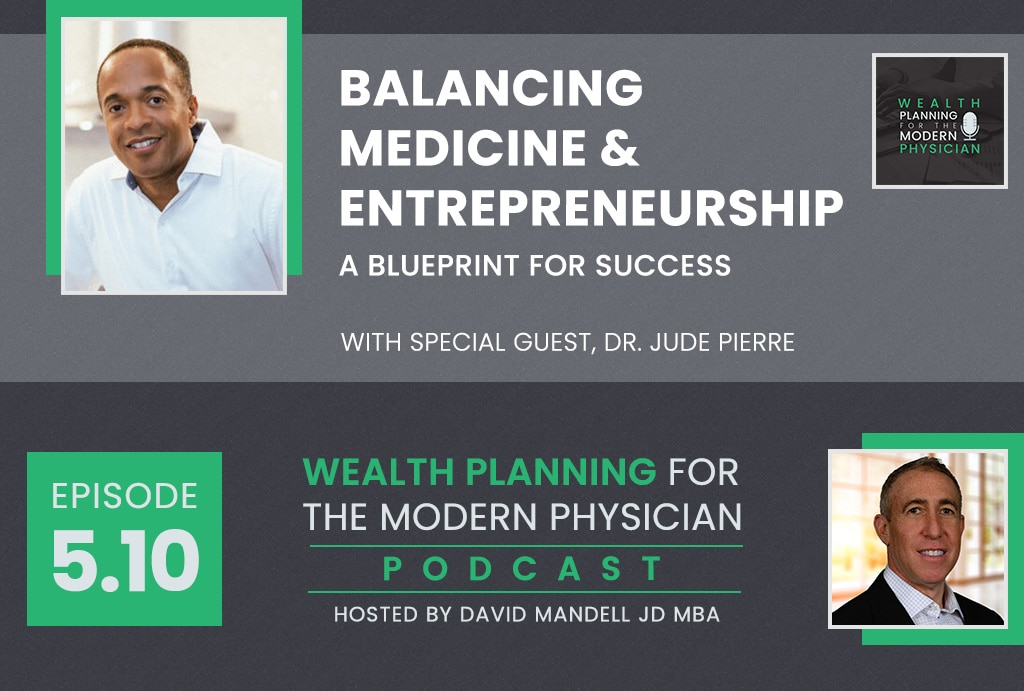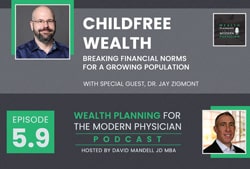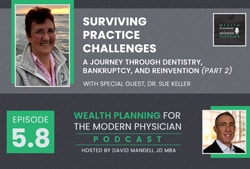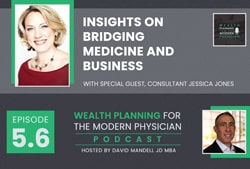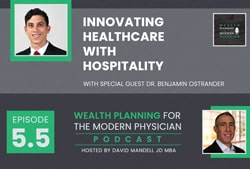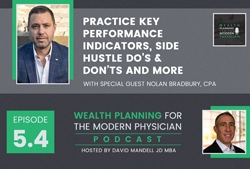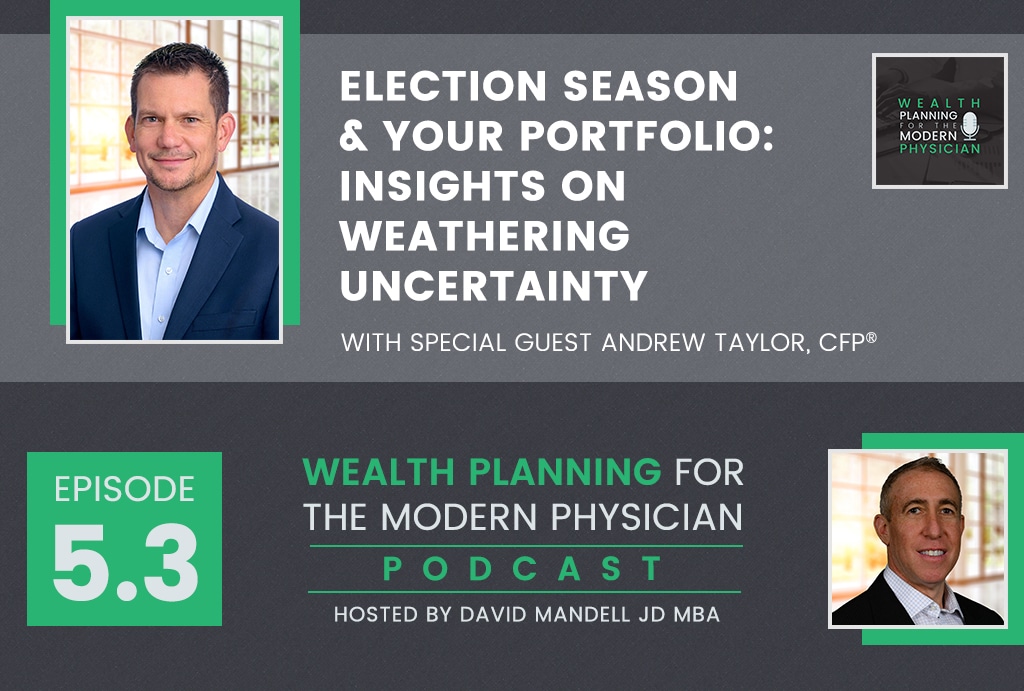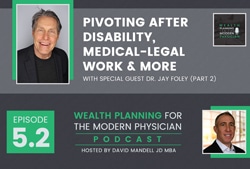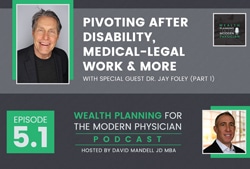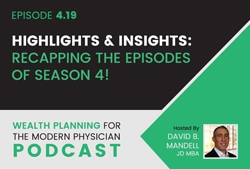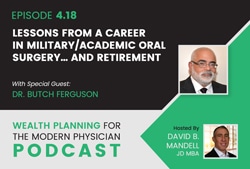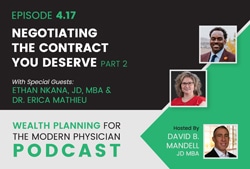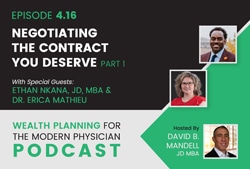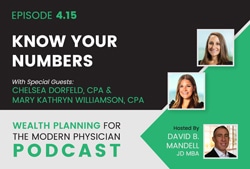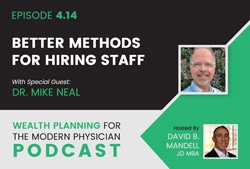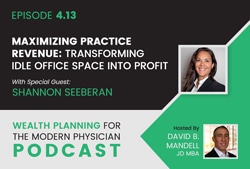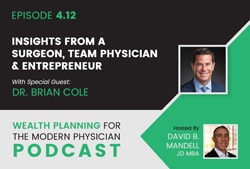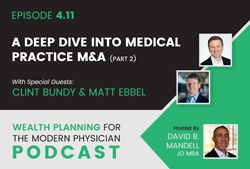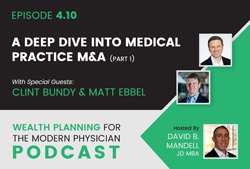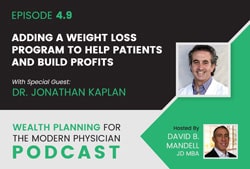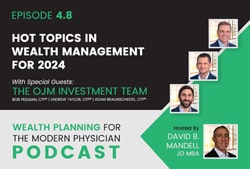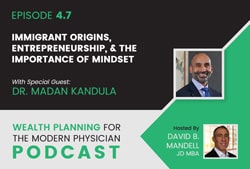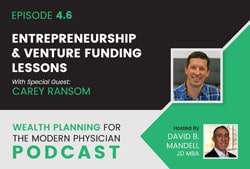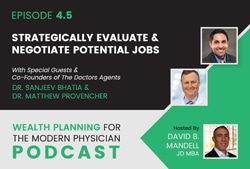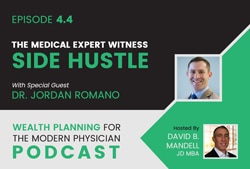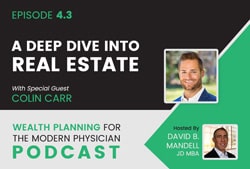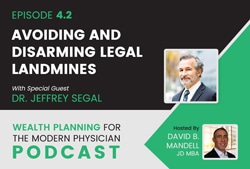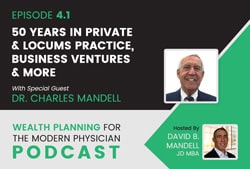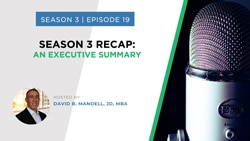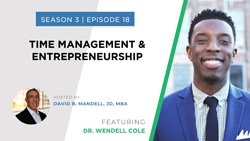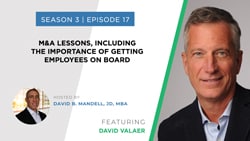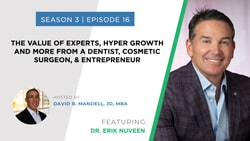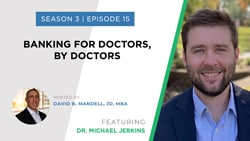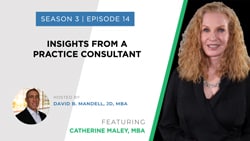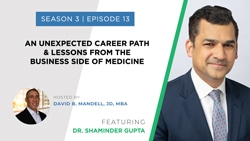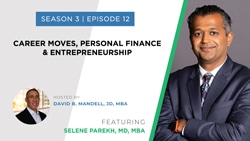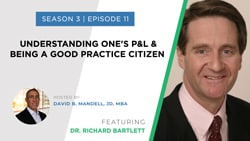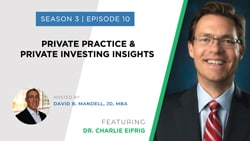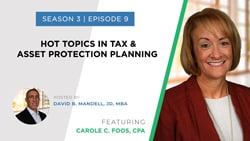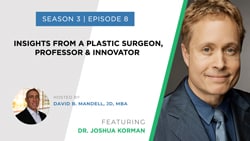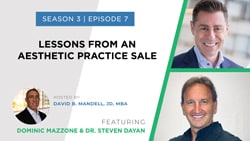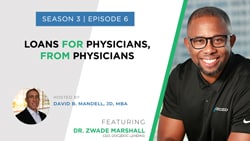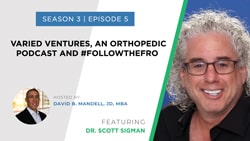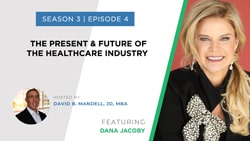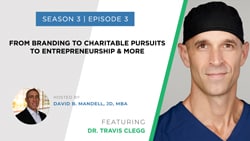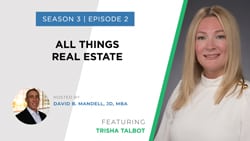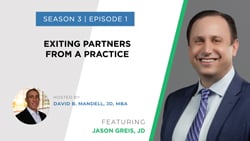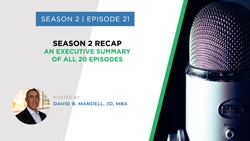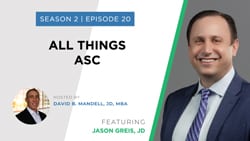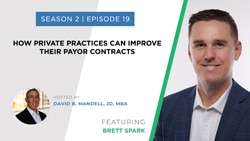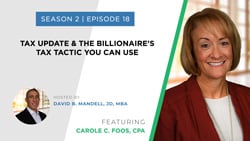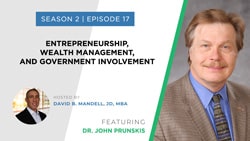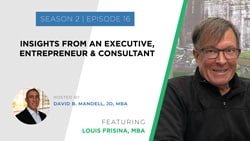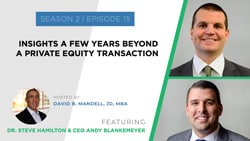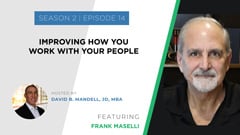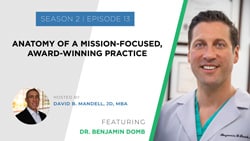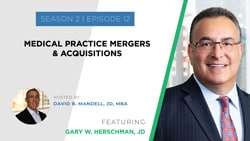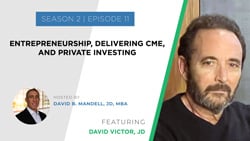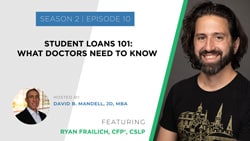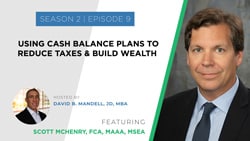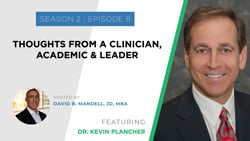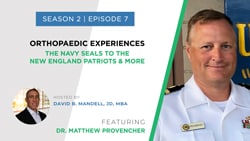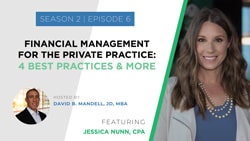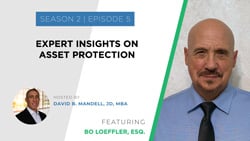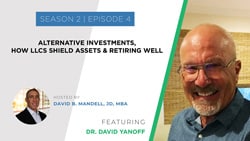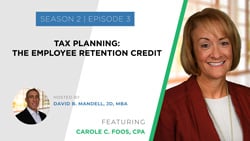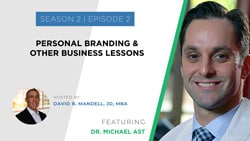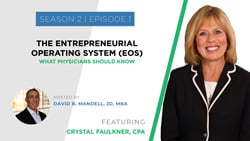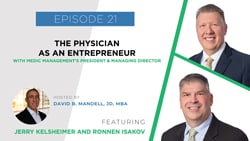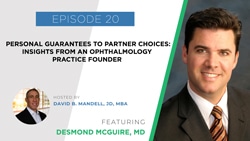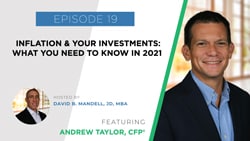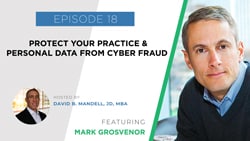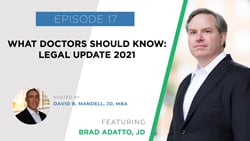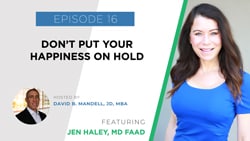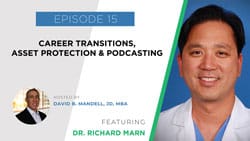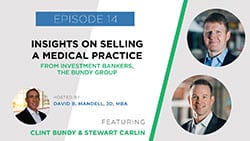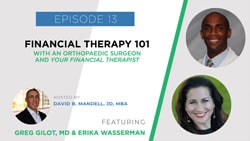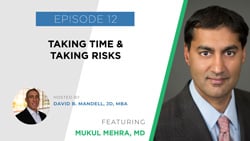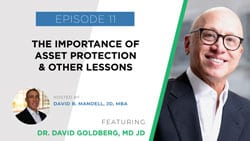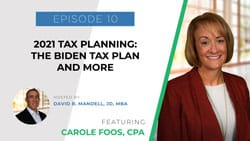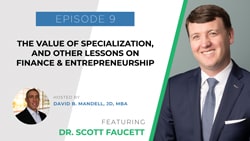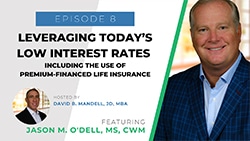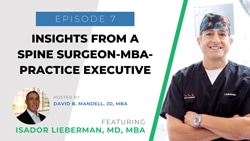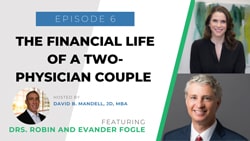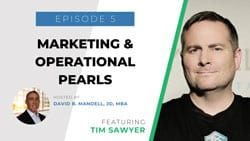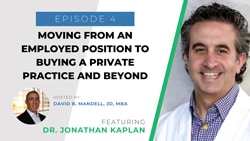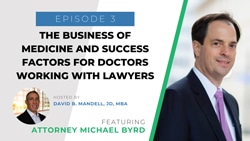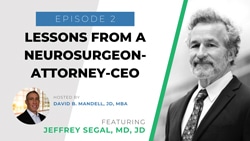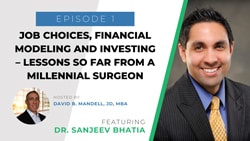WEALTH PLANNING FOR
THE PODCAST
HOSTED BY DAVID B. MANDELL, JD MBA
Join attorney, wealth manager, and well-known author David Mandell, JD, MBA for Wealth Planning for the Modern Physician, a podcast dedicated to improving a physician’s financial bottom line. This podcast for physicians focuses on the wealth planning concerns faced by today’s doctor, with the goal of helping physicians make better financial decisions. Tune in to our exclusive podcast series, where we delve into the world of wealth management for doctors. Discover expert insights, tailored strategies, and practical tips to help you maximize your earnings, protect your assets, and achieve long-term financial success. David talks with doctors from every specialty and stage of career about their real-world lessons in financial matters, and interviews industry experts in all areas of wealth management. Join our community of medical professionals taking control of their financial well-being. Take advantage of this invaluable resource—subscribe now and start building a solid foundation for your wealth management journey.
Look for new episodes every other Wednesday. Subscribe and listen today!
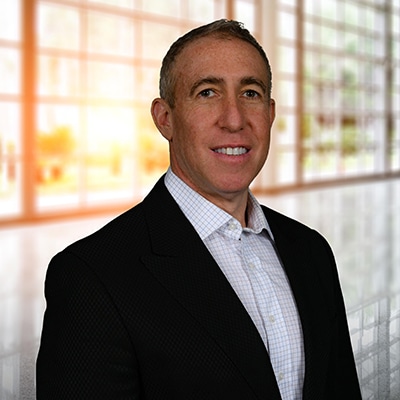
David Mandell is an attorney and renowned authority in the fields of asset protection and wealth management. He is a co-author of more than a dozen books, including Wealth Management Made Simple and Risk Management for the Practicing Physician.
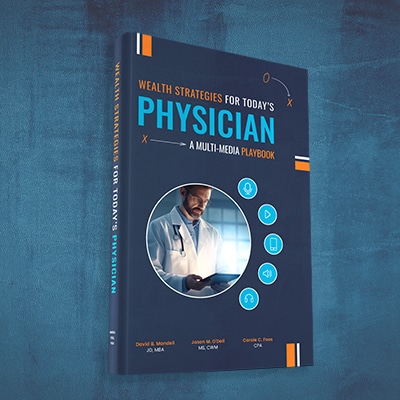
OJM Partners have crafted this Playbook in an innovative multi-media format, featuring over 250 pages of text and more than 90 links to videos and podcast episodes. Organized in seven Strategies, the Playbook can help physicians protect assets, reduce taxes, invest wisely, make informed insurance choices, plan properly for retirement, and more.

For 17 years, OJM Group has helped physicians across the U.S. with the financial challenges they face as individuals, employees, and medical practice owners. Click the button below to learn how we work with physicians.
Subscribe and be the first to get our latest episodes!
Disclosure
OJM Group does not endorse any guest, their opinions, or services. This podcast is for informational purposes only. The ideas and opinions expressed by Mr. Mandell and his guests do not constitute any legal, tax, or investment advice, or a recommendation of any particular security or strategy, and do not represent the opinions of the underwriters of this program. Any information prepared rom third-party sources is believed to be reliable, though its accuracy is not guaranteed. Opinions expressed in this commentary reflect subjective judgements of the speakers based on conditions at the time of recording and are subject to change without notice. Listeners should seek input from their own financial, tax, and legal professionals before acting on any of the information provided. Past performance is not indicative of future results.
EPISODES
In the second part of their conversation, David Mandell and Corey Kleinschmidt focus on the practical steps physicians should take when considering locum tenens work, including educating themselves through resources like Locumpedia’s No BS Guide and talking to experienced locum physicians. Corey emphasizes the business side of locums—such as taxes, LLC formation, negotiating pay rates, and thoroughly vetting staffing agencies—as critical to success. They also discuss the importance of multi-state licensing, credentialing processes, and the support staffing firms can offer in simplifying logistics like travel, housing, and malpractice coverage.
In Part 1 of this two-part episode, David Mandell talks with Cory Kleinschmidt, founder of Locumpedia, about the evolution of locum tenens. They explore how this once-overlooked staffing model has become a strategic option for both physicians and healthcare systems. Cory also shares his personal journey into the industry and why locum tenens is gaining popularity across career stages.
Dr. Jude Pierre returns to the podcast with host David Mandell to discuss physician entrepreneurship, financial missteps, and smart career decisions. From avoiding risky real estate purchases to leveraging medical scribes and Medicare Advantage, Dr. Pierre shares practical strategies that have helped optimize his practice. The episode also explores the importance of self-care, personal financial planning, and owning medical real estate to build long-term success.
In episode 5.14, attorneys Michael Byrd and Brad Adatto return to the podcast—this time together—to share insights around the legal risks of weight loss drugs—are physicians unknowingly putting their practices at risk? They also reveal why private equity is pulling back and how doctors can navigate the shift from Wall Street to Main Street deals. Plus, get the latest on non-compete agreements and what changing laws mean for medical professionals. Don’t miss their insights on staying compliant and protecting your practice in an evolving legal landscape!
In this episode, Dr. Pat St. Pierre shares his unique journey from serving in the infantry in Korea to becoming an orthopedic surgeon and a leader in robotic shoulder surgery. He discusses key career insights for physicians, including choosing the right practice, working with industry partners, and financial planning. Dr. St. Pierre also highlights his approach to retirement, emphasizing the importance of transitioning to something meaningful, which for him includes achieving one of the highest levels of wine education in the world.
In episode 5.12, host David Mandell speaks with medical marketing consultant Kristy LaGourgue and aesthetic nurse Rachel Varga about the essential branding and marketing strategies doctors need, whether they own a practice or not. They discuss common marketing mistakes, the importance of personal branding, and how social media can serve as a tool for patient acquisition and professional growth. The episode also explores how marketing can help doctors expand services, increase practice valuation, and create new business opportunities beyond patient care. Listen or watch today!
In this episode, host David Mandell is joined by CPAs Carole Foos and Greg Heimkreiter to discuss the potential tax changes coming in 2025, including the expiration of key provisions from the 2017 tax reforms. They explore the impact on individual income tax rates, estate tax exemptions, business deductions, retirement contributions, and qualified opportunity zones, emphasizing the uncertainty surrounding legislative updates. The conversation also highlights industry shifts in tax preparation, the growing difficulty of finding experienced CPAs, and strategic planning steps high-income earners should consider to navigate the evolving tax landscape. Listen or watch today!
Listen in or watch episode 5.10 where David talks with Dr. Jude Pierre—a physician with a rich background in internal medicine, entrepreneurship, and coaching for healthcare professionals. He shares his journey from growing up in Haiti and pursuing a medical career in the U.S. to navigating challenges like debt, burnout, and starting his coaching business, podcast, and Medicare Advantage course. Dr. Pierre emphasizes the importance of seeking wise counsel and building balanced practices to achieve long-term success in medicine and entrepreneurship.
Listen in or watch as host David Mandell interviews financial advisor Jay Zigmont PhD, MFA, CFP®, the CEO of Childfree Wealth. David begins that he had read’s Jay first book and was extremely interested in the topic—as he and his wife Sheila do not have children. He and Jay then discuss Jay’s background and how he came to direct his career around helping child-free clients and more.
In Part 2, Dr. Sue Keller continues her conversation with David and delves into the emotional and financial challenges of filing for bankruptcy after 20+ years in private practice. She shares how this pivotal moment led to personal growth, working part-time with less stress, and ultimately transitioning to life coaching. This episode highlights resilience, rediscovering passions, and the importance of balance and support systems for long-term success.
Dr. Sue Keller sits down with David to share her journey from a young passion for dentistry to the challenges of managing a niche practice. She reflects on financial struggles, staff turnover, and adapting during the 2008 recession. Sue highlights key lessons in resilience, financial management, and the importance of using specialists to maintain quality care.
In this episode, host David Mandell interviews Jessica Jones, a practice consultant specializing in medical and dental practices, about the common challenges doctors face and strategies for aligning their practices with their passions and patient needs. Jessica highlights the importance of delegation, service diversification, and stepping back to brainstorm improvements for both cash-based and traditional practices.
In this episode, host David Mandell interviews Dr. Benjamin Ostrander, chief resident in otolaryngology at UC San Diego, about his journey from engineering to medicine. They discuss how medicine can innovate by learning from other industries, with a focus on aviation’s checklist model and the principles of hospitality. Dr. Ostrander shares his research on applying hospitality concepts to improve patient experience, employee satisfaction, and hospital environments. He also provides resources for those interested in implementing these ideas in their practices.
In this episode, CPA Nolan Bradbury and host David Mandell discuss key financial strategies for private practices, including the importance of Key Performance Indicators (KPIs) and effective delegation. They also explore critical success factors for physicians considering side hustles or entrepreneurial ventures, highlighting the need for proper legal, financial, and operational management. Finally, Bradbury emphasizes the importance of long-term planning for practice exits, ensuring practices are well-positioned for profitable sales or mergers.
In episode 5.3, David Mandell sits down with OJM Group’s Andrew Taylor, CFP, to discuss investing during election seasons, highlighting market resilience through historical crises, the impact of political changes, and the importance of long-term strategies. Taylor emphasizes that markets thrive under both political parties and a divided Congress, advising against fear-driven decisions and stressing prudent portfolio allocation for varying risk tolerances. Listen in today!
Episode 5.2 serves as part 2 of the conversation with Dr. Jay Foley where he shares how his snowboarding injury led him to pivot from clinical practice to medical-legal work. He discusses the impact of his disability insurance and his transition into expert witness roles and case evaluations, providing insights into the pros and cons of this career shift. Jay also offers advice to physicians considering alternative paths and emphasizes the importance of long-term planning and disability insurance.
In this episode, host David Mandell interviews orthopedic surgeon Dr. John “Jay” Foley about his path to medicine and how he built a thriving practice. Jay also recounts a life-changing snowboarding accident that forced him to reconsider his career. This is part one of a two-part conversation where they dive into Jay’s journey post-injury.
In this 19th and final episode of Season 4, host David Mandell recaps the season’s 18 episodes. He briefly summarizes each episode and highlights a pearl or two from each. This can serve as a helpful reminder for listeners who have heard all 18 episodes to revisit ones that they found most valuable, and can motivate those who missed any episodes to listen or watch them during the summer, as we also run our Summer Rewind Series.
In this podcast episode, host David Mandell welcomes Dr. Butch Ferguson, a retired oral and maxillofacial surgeon. Together they talk about his extensive career in the US Army Dental Corps and his tenure at Augusta University. They discuss the rewards and challenges of teaching at a Level 1 trauma center and the valuable career and financial advice he imparted to his students. Dr. Ferguson also shares his initial struggles with retirement, the importance of planning and routine during this transition, and his new business venture providing consulting and continuing education. He concludes by offering advice to other doctors on how to retire well and maintain a fulfilling post-career life.
In this continuing episode, host David Mandell sits down with Ethan Nkana, JD, MBA, founder of Rocky Mountain Physician Agency and his client, Dr. Erica Mathieu, Chief Medical Officer at Primary Health Solutions. Here, in part two of this two-episode interview, David begins the discussion with Erica, looking at her situation as a case study – first discovering what her frustrations were with her then-present job, how she found Ethan to help her, and their process of renegotiating her employment contract over the ensuing months. They focus on key success factors, such as leverage through other job offers and the timing of negotiations.
In this episode, host David Mandell sits down with Ethan Nkana, JD, MBA, founder of Rocky Mountain Physician Agency and his client, Dr. Erica Mathieu, Chief Medical Officer at Primary Health Solutions. In part one of this two-episode interview, David begins the discussion with Ethan, covering his background in law and as a hospital administrator, where he used to negotiate physician employment contracts from the employer side. He explains his agency’s approach to contract negotiations in representing doctors and the common misconceptions physicians believe which hold them back in getting better deals.
In this episode, David Mandell welcomes CPAs Chelsea Dorfeld and Mary Kathryn Williamson from Aprio to discuss financial management strategies for medical and dental practices. They emphasize the importance of understanding key numbers, such as expenses and revenues, and regularly monitoring them to optimize profitability. The episode highlights the significance of evaluating fees, managing staffing costs, and providing proactive, forward-looking advice to effectively manage healthcare practices amidst market changes and rising expenses.
This episode features optometrist Dr. Mike Neal discussing the challenges of hiring in medical practices and his creation of a business to address staffing issues. They explore flaws in traditional hiring methods, emphasizing the importance of assessing candidates’ natural talents over resumes and interviews. Dr. Neal highlights the necessity of rapid decision-making in hiring and warns about the impact of AI, which can flood employers with unqualified applicants.
Join host David Mandell for episode 4.13 where he welcomes Shannon Seeberan, co-founder of CloudMedSpas. During the interview, discover how CloudMedSpas innovative platform empowers medical professionals to monetize unused office space, opening a stream of untapped practice revenue. Gain insights on entrepreneurship, shared space optimization, and the future of healthcare practice management.
In episode 4.12, host David Mandell welcomes Dr. Brian Cole to discuss his career as an orthopedic surgeon and explore his journey from medicine to entrepreneurship. Dr. Cole shares insights on the intersection of business and healthcare, emphasizing the importance of financial literacy and asset protection for physicians. He advocates for young physicians to seek leadership roles in professional societies, highlighting the opportunities for personal growth and career development these positions offer. Throughout the episode, Dr. Cole underscores the value of education, mentorship, and seizing opportunities for success in both medicine and business.
In the second part of the podcast, host David Mandell continues his conversation with investment banker Clint Bundy and private equity principal Matt Ebbel, focusing on the factors that contribute to successful mergers and acquisitions (M&A) in the healthcare sector, including medical, dental, and veterinary practices. They delve into what makes a practice an attractive acquisition target, the importance of cultural and strategic alignment, and future trends in healthcare M&A.
Listen or watch part 1 of this interesting episode as host David Mandell takes a deep dive into healthcare mergers and acquisitions (M&A) with investment banker Clint Bundy and private equity firm principal Matt Ebbel. They discuss the advisory and strategic roles they play, aiming to maximize value and find the best partnerships for business or practice owners looking to sell or raise capital.
In episode 4.9, host David Mandell welcomes back Dr. Jonathan Kaplan. Together, they discuss integrating weight loss programs into medical practices, focusing on medications like Ozempic. They explore considerations for physicians, emphasizing the potential for profit, patient satisfaction, and recurring revenue. Jonathan shares experiences of starting a weight management program and highlights the scalability and automation benefits. The podcast concludes with insights on applying similar business processes to other modalities, showcasing the immediate gratification of helping patients in diverse healthcare areas.
Listen in as host David Mandell chats with Certified Financial Planners Bob Peelman, Adam Braunscheidel, and Andrew Taylor from the OJM Group on three wealth planning topics that are relevant for 2024. Together they share insights on 529 plans, health savings accounts, and address questions around investing in bonds or holding onto cash.
Listen in as host David Mandell interviews Dr. Madan Kandula, ENT surgeon, entrepreneur, and CEO of Advent, which he has grown to over 250 team members across 18 locations, serving over 1500 new patients monthly. Dr. Kandula shares his background, including a brief description of his family’s immigrant story from India, emphasizing the struggles his parents overcame and how this impacted his life and career.
In this podcast episode, David welcomes Carey Ransom, an experienced entrepreneur, venture capitalist, and angel investor. Carey traces his entrepreneurial drive back to his upbringing in a family business. He emphasizes the importance of realistic market evaluation and expresses skepticism toward founders overly attached to their solutions. Carey also shares insights on startup boards, emphasizing the significance of a management team’s learning and adaptability. The conversation touches on Carey’s current venture, Bonus, before concluding with his advice for physicians contemplating entrepreneurial pursuits.
In this episode, David welcomes back two guests from earlier seasons—orthopaedic surgeons Dr. Sanjeev Bhatia and Dr. Matthew Provencher. Sanjeev and Matt join David to discuss a new venture they’ve founded, along with David, called The Doctors Agents (TDA).
Dr. Jeffrey Segal, a neurosurgeon, attorney and founder of Medical Justice, returns to the podcast for Episode 4.2, where he and David discuss current legal landmines facing physicians. From licensing to malpractice to sham peer reviews, Jeff dives into some important advice for physicians and potential legal concerns.
To kick off Season 4 of the podcast, David welcomes a very special guest – his father, radiologist Dr. Charles Mandell. David begins by asking Charlie, as he does with all physician guests, where he is from and what led him to become a physician in general and a radiologist in particular. Charlie shares a bit about his first job out of training, his move to become chairman of a group radiology practice after a few years, his various entrepreneurial business ventures, and he shares insight around what he has learned about the business of medicine.
In this episode, David is joined by Dr. Wendell Cole, a physician in training who is also a book author, entrepreneur and podcast host. David and Wendell discuss Wendell’s approach to time and task management, including the use of batch processing and what got him interested in medicine. They also discuss entrepreneurship and a bit about real estate investment.
Listen in as host David Mandell chats with entrepreneur, former practice CEO and consultant David Valaer. David V. shares details about his former career as a naval Top Gun aviator including lessons from his training that he imparts to practices today. He explains why his experience as a 100% owner of a company that went through an M&A transaction some years ago impacts his entire approach to working with medical practice owners.
In this episode, cosmetic surgeon Dr. Erik Nuveen joins David to discuss his career path, his practice’s growth, what he has learned about the business of medicine in building a cosmetic surgery platform. Erik begins by explaining his dual trainings and degrees in dentistry and medicine and how his family background shaped both his medical/dental career and his entrepreneurial spirit.
In this episode, David is joined by Dr. Michael Jerkins, internist, pediatrician, and co-founder and President of Panacea Financial. Michael begins with his background and what got him interested in medicine. He explains his decision to postpone medical school for a year and get a master’s degree in Education, and how teaching is still part of his passion and career. Michael shares about the physician-focused financial services company, Panacea Financial and concludes the conversation with some common misconceptions doctors have around banking and debt.
Listen in as David chats with medical practice consultant Catherine Maley. She talks about her business with medical practices nationally and internationally and then discusses what she is seeing in terms of important branding elements for all types of practices. Catherine also dives into some of the best medical practice marketing she is seeing—from content marketing to reviews to texting.
In this episode, Dr. Shaminder (Shammi) Gupta joins David to discuss his career path, the impact of Hurricane Katrina on that path, and what he is learning from being a business executive as well as a clinician. Shammi begins with his background, then covers how he built a significant dialysis practice in a smaller town setting, became president of the Kidney Foundation, and built a reputation throughout the state. Their conversation concludes with Shammi’s insights on wealth management and three pieces of advice for fellow physicians—especially those starting out.
In this episode, orthopaedic surgeon Dr. Selene Parekh joins David to discuss his career path, academic medicine, entrepreneurship, finance and more.
Selene begins with his background–where he grew up, what got him interested in medicine and orthopaedics in particular. He then explains his early exposure to and interest in financial topics, and why he chose to pursue an MBA.
The episode concludes with Selene summarizing a lecture he often gives to physicians on work-life balance and offering his one piece of advice for young physicians.
In this episode, plastic surgeon Dr. Richard Bartlett joins David to discuss his career, academic and private practice, financial decisions and more.
Richard begins with his background – where he grew up, what got him interested in medicine and surgery in particular — and his lack of interest in finances as he went through medical and surgical training. He and David then cover his 15 years as an academic surgeon, what he learned financially in creating a plastics foundation from scratch, as well as his decision to create a private practice and the value of “being a good citizen” in making that transition easier.
In this episode, retina specialist Dr. Charlie Eifrig joins David to discuss his career path, private practice, private investments, financial decisions and more.
Charlie begins with his background, including what got him interested in medicine and ophthalmology in particular and his exposure to and interest in financial topics, both in college and during medical training. He explains why he took his first job out of training in North Carolina as part of a small growing practice and why he moved across the country to join a practice in Orange County, CA.
In this episode, plastic surgeon Dr. Joshua Korman joins David to discuss his career path, academic and private practice, innovation, financial decisions and more.
Josh begins with his background – where he grew up, what got him interested in medicine and plastics in particular. Josh explains why he took his first job out of training at Kaiser, the reasons he left to form a private practice, and the factors he sees as most important in guiding those career choices.
Josh shares his experiences with innovation, his thoughts on investing, and the benefits and challenges of his role as a professor at Stanford.
Listen in as David chats with facial plastic surgeon Dr. Steven Dayan and MedSpa Partners (MSP) CEO Dominic Mazzone. They discuss the consolidation in medicine in general and aesthetics in particular and delve into why Steven chose to sell his practice to MSP.
David begins the conversation by asking both Steven and Dominic about their upbringings and career paths. Steven explains how his practice grew over the decades with his use of research and “guerilla marketing,” and when selling the practice first appeared on his radar.
David concludes with asking Steven to give his best pearls of advice for fellow physicians considering a sale.
In this episode, David is joined by Dr. Zwade Marshall, an anesthesiologist/pain medicine physician, as well as co-founder and CEO of Doc2Doc Lending.
Zwade begins with his background – where he grew up and what got him interested in medicine. Zwade the story behind Doc2Doc Lending–how they evaluate physician borrowers differently than banks do, how their program fared during COVID, and the rate at which they have been growing. David and Zwade then discuss the misconceptions many doctors have around debt, including emotions connected to it and the stress created by debt during training and early years of practice. Zwade explains how Doc2Doc Lending has raised money from physicians in practice to make these loans–the “equity” side of the business.
In this episode, orthopaedic surgeon Dr. Scott Sigman joins David to discuss his career path, business and entrepreneurial endeavours, marketing, podcasts, and more.
Scott begins with his background – where he grew up, what got him interested in medicine and orthopaedics. He explains how both of his parents were entrepreneurs and how he realized early on the need for leveraging the expertise of others.
Finally, Scott gives David two important pieces of business advice for fellow physicians, especially younger doctors.
Listen in as David chats with Dana Jacoby, a thought leader and consultant in the healthcare industry.
Dana begins by explaining how she was initially attracted to the healthcare field, and shares details about the first part of her career at large multi-national healthcare firms. She then describes the origins of her firm Vector Medical Group, including her motivation to launch the firm.
Next, David and Dana discuss the current state of the healthcare industry, including the impact of technology and consolidation, and her bullish view of the industry, focusing on innovation.
In this episode, orthopaedic surgeon Dr. Travis Clegg joins David to discuss his career path, wealth management decisions, charitable endeavors and more.
Travis begins with his background – where he grew up and what got him interested in medicine and orthopaedics. He explains how he did not have much exposure to finance early in his career but became an avid reader/listener of content to educate himself. David and Travis then discuss Travis’s process for choosing his first job out of training as a hospital employee and what he saw as the pros and cons there vs. private practice, where he has been for a few years.
Listen in as David chats with Trisha Talbot, real estate advisor and entrepreneur behind DocProperties.
Trisha begins by explaining what her training, certifications, and experience in real estate were before launching her own firm. She then relates her motivation to launch DocProperties and delves into the unique aspects of healthcare real estate and the challenges for physicians looking to own it.
Trisha then shares her answers to a few common questions she hears from physicians and discusses a typical first step for a doctor considering a new office or piece of real estate. Finally, Trisha explains when a practice might consider selling a property, and important factors affecting that decision.
Listen in as David chats with nationally recognized healthcare attorney Jason Greis about the important and sensitive topic of creating win-win strategies for exiting retiring partners from a medical practice. Jason begins by describing his firm and practice and then gives some reasons why setting a partner exit pathway is so important for the exiting partners, the practice and younger partners. Jason covers what is typically involved to incorporate exit plans into the legal documents of a practice and why having a solid exit plan can actually be a practice differentiator for recruitment of younger physicians.
In this 21st and final episode of Season 2, David recaps the season’s 20 episodes. He briefly summarizes each episode and highlights a pearl or two from each. This can serve as a helpful reminder for listeners who have heard all 20 episodes to revisit ones that they found most valuable, and can motivate those who missed any episodes to visit our podcast page and listen during the show’s hiatus.
Look for new episodes in August when the Wealth Planning for the Modern Physician podcast resumes with Season 3!
Listen in as David chats with nationally recognized healthcare attorney Jason Greis about all things related to ambulatory surgery centers (ASCs). Jason provides an overview of his firm and practice and then outlines some benefits of ASC ownership for physicians, along with some trends he is seeing in the marketplace.
Jason then explains the restrictions that can limit ASC involvement for physicians and describes the types of doctors or groups that may not be a good fit for ASC ownership. David and Jason then discuss four common pitfalls physicians might encounter when starting a new ASC, how payors are dealing with ASCs, and what Jason sees in terms of joint ventures these days.
Jason then speaks to financial returns for an ASC, including ROI and valuation multiples, and concludes with pearls of advice for physicians considering an ASC launch and those already involved with one.
Listen in as David chats with Brett Spark, the President of Aroris, a healthcare consulting firm. Brett outlines his career path in various areas of healthcare, from large institutions to CEO of small private practices, and his decision to create Aroris and become an entrepreneur.
Brett then explains where he sees the most common payor contract pitfalls in private practices and why a review of such contracts—to understand what a practice has as baseline—is so critical. He also describes how their process involves a full discovery “diagnostic” of all payor contracts before even entering into negotiation.
This episode focuses the timely topic of taxes, as it is released on April 14. OJM Group partner and CPA Carole Foos joins David to talk taxes.
David starts by turning the mic over to Carole for an overview of the latest developments in tax proposals from the Biden Administration, which recently released its 2023 budget proposal. Carole covers the latest on C corporations, S corporations SALT limitations, capital gains and income tax rates.
David then examines one element of the Biden proposal – the “Billionaire’s tax” – and explains how the super-wealthy use one tax strategy to avoid capital gains taxes on appreciated assets. He shares a few examples and quotes from articles, and then explains the strategy: Buy, Borrow, Die.
David then outlines four ways physicians can use “Buy Borrow Die” in their own planning, including ways he has implemented the strategy for himself.
Carole and David then conclude by encouraging all listeners to focus on their 2022 tax planning early in the calendar year.
In this episode, pain management specialist Dr. John Prunksis joins David to discuss his career path, the significant growth of this practice, and his involvement with the Lithuanian Parliament and U.S. government.
Listen in as John first explains how he became involved with the Lithuanian Parliament and what he helped accomplish as a member there. John and David then discuss John’s path into pain management from anaesthesia, the challenge of creating a pain-centered private practice early on, and the value he gained from joining a CEO/business owner study group.
Listen in as David chats with former biotech corporate executive, multiple-time entrepreneur and medical practice consultant Louis Frisina. They begin by discussing Louis’s career path, from embarking on studies leading to both law and medicine and then shifting to a business career as a management consultant.
Louis then walks listeners through his biotech career—starting as an executive at a Swiss multi-national firm and then to Fisher Scientific—eventually deciding to leave the C-suites and join a small startup… and then another.
Louis then explains why he wanted to enter the field of aesthetic medicine and how he ended up working with physicians and medical practices as a consultant.
Finally, Louis provides a few insights on the best practices he sees in private medical practice and his current focus on the growing trend of regenerative medicine.
Listen in as David chats orthopaedic surgeon Dr. Steve Hamilton and practice CEO Andy Blankemeyer as they discuss what they have learned a few years out of a private equity investment into their practice – Beacon Orthopaedics and OrthoAlliance.
After Steve and Andy initially explain their roles at the practice and the growth they have enjoyed in recent years, David discusses this business journey with them, beginning with how they came to consider a private equity partner following initial skepticism.
Steve and Andy then explain the challenges that high growth has presented, as a physician working in the practice and CEO running the practice. They chat with David about the importance of culture fit, flexibility, physician autonomy, the challenges COVID presented and more.
Finally, Steve and Andy impart some lessons learned and give advice to other physicians and practices considering private equity transactions.
Listen in as David chats with author and consultant Frank Maselli. They begin by discussing Frank’s career path, from the military to Wall Street to being a speaker, author and trainer.
They then examine what Frank thinks about assessment tests and how he approaches them. Frank then explains the “3-part mind” and how it impacts interactions with your team. Next, Frank explains the Kolbe A test and how he uses this to evaluate teams. David and Frank then chat about how this evaluation worked at OJM Group.
Finally, Frank gives some advice about how to hire the right person for the job and the kind of work he does with organizations to get the most out of the people they already have.
In this episode, orthopaedic surgeon Dr. Benjamin Domb joins David to discuss his career path, running a large subspecialty practice and the award he and the practice recently won. Listen in as Ben explains how he always wanted to be a sports medicine orthopaedic surgeon, even though he comes from a family of professional musicians. Ben and David then discuss the financial challenges of physicians during training, Ben’s decision-making process in choosing his first job, and the importance of a “privademic” environment to him.
Next David and Ben discuss Ben’s decision to move his Foundation from the original practice and form a new hip-only clinical practice alongside it. They discuss Ben’s role in his practice, his hiring of a CEO, and the importance of being “mission-focused.” David then asks Ben about the circumstances around his winning the Ernst & Young Entrepreneur of The Year 2021 Midwest Award. Finally, David and Ben discuss the One Thing he would tell younger physicians.
Listen in as David chats with nationally recognized healthcare mergers and acquisitions (M&A) attorney Gary Herschman. Gary begins by describing his firm and practice and then gives some statistics in terms of the number of M&A deals in the medical practice space.
David and Gary then dive into the reasons why a medical practice might consider merging with another practice, becoming an acquirer or being acquired. They then discuss how investors value medical practices, when to involve an attorney, and key success factors. Finally, Gary explains why an accurate understanding of the deals that are out there benefits physicians, even if they decide not to move forward.
Listen in as host David Mandell chats with entrepreneur and experienced private investor David Victor. They begin by discussing Victor’s career path, leaving the practice of law to join his father in the startup that became American Education Institute (AEI), where Mandell lectures every year.
They then explore AEI in more depth – what services it offers, why physicians might be interested in it, how COVID forced Victor to transform the business, and why the business may be stronger now than ever before.
Next, Victor explains his approach to investing in private businesses, including a dive into a cannabis-focused real estate project he is excited about today. He concludes with some advice to others looking to invest significantly into private businesses.
Listen in as David chats with student loan expert Ryan Frailich. David and Ryan begin with Ryan’s career path — from a teacher to human resources professional to Certified Financial PlannerTM with an expertise and certification in student loans (CSLP).
David and Ryan then dive into student loans – discussing Income Driven Repayment plans, the pros and cons of private refinancing, the Public Service Loan Forgiveness program, and various factors that can impact an individual physician’s student loan management strategy.
Finally, Ryan gives his thoughts on how young physicians in practice should think about balancing the desire to pay off student loans with other financial goals.
Listen as David chats with retirement plan expert Scott McHenry. David and Scott talk about Scott’s career path – from a position inside a large firm to the transition to his own firm about 15 years ago.
David and Scott then dive into Cash Balance Plans (CBPs). They discuss how these plans can be more favorable than other qualified plans, such as pensions, profit-sharing plans and 401(k)s, and define the type of practice or physician that is a good candidate for a CBP.
They wrap up with key success factors in implementing CBPs, how CBPs can work with 401(k)s, what happens if a CBP is terminated and how Scott and his firm work with physicians and practices throughout the U.S.
In this episode, orthopaedic surgeon Dr. Kevin Plancher joins David to discuss his academic and private practice career, experiences with finance and speaking alongside David at an upcoming orthopaedic meeting.
Listen in as Kevin explains how he ended up in orthopaedics when coming from a family in finance and building a department with other “young guns” in his first job out of training. Kevin then talks about his decision to leave the hospital setting for his own practice after some years.
Next David and Kevin discuss his interest in academics and how Kevin balances his practice responsibilities with two teaching positions at two medical schools. They then chat about a finance course where both David and Kevin will be speaking, as part of the Ortho Summit in Las Vegas in December. Kevin explains why it is important to him to speak with fellow doctors about business and finance.
Finally, David and Kevin discuss the One Thing he would tell younger physicians and the One Thing he would counsel fellow experienced doctors.
In this episode, orthopaedic surgeon Dr. Matthew Provencher joins David to discuss varied experiences he has had in his career.
Listen in as Matthew explains how he ended up in orthopaedics when his dream of being a Navy pilot didn’t work out. He then talks about his experience as a Naval surgeon, taking care of the SEALs and working on humanitarian missions and what he learned from those positions. He continues to share details about his time at Mass General in Boston, his time as the team physician for the New England Patriots , and what led him to move from Boston to Vail and join the Steadman Clinic.
Finally, they wrap up the episode sharing some information about a few of Dr. Provencher’s entrepreneurial activities.
Listen in as David chats with CPA and financial consultant Jessica Nunn. David and Jessica discuss Jessica’s initial interest in finance and accounting, including her education and initial jobs with larger firms working with public companies.
David and Jessica then dive into Jessica’s decision to go out on her own to help smaller clients like medical and dental practices and their owners. Then Jessica discusses how she helps practice owner clients today, giving some real examples of challenges that arise and how to improve processes and profitability.
Listen in as David chats with author and nationally recognized asset protection attorney Bo Loeffler. David and Bo begin by discussing Bo’s background as a litigator and U.S. Bankruptcy Trustee and how that has helped him as an asset protection attorney. Bo also chats about his experience in representing lottery winners.
David and Bo then dive into a few specific tools often used in asset protection planning, including insurance and exempt assets. They then cover limited liability companies (LLCs) and trusts—discussing the key success factors for each and pitfalls to avoid.
In this episode, orthopaedic surgeon Dr. David Yanoff joins David to discuss varied topics. Listen in as Dr. Yanoff shares why he initially became interested in medicine and how his military service guided him into orthopaedic surgery. He then explains his sudden departure from his first practice for a new town and how that led to building a thriving practice and owning the building where he practiced.
They discuss this, his process for gradual retirement, and much more, in episode 4 of season 2 of the Wealth Protection for the Modern Physician podcast.
This episode focuses on the timely topic of the Employee Retention Tax Credit (ERC), which many medical practices may be able to take advantage of for significant tax savings. From its origins in the CARES Act in 2020 and the rules that related to it around the PPP loans and more, to the changes recently enacted by Congress as a part of the Consolidated Appropriations Act of 2021 (CAA).
In conclusion, Carole explains what medical practices should be doing now to see if they are eligible for the ERC.
Listen in as Michael explains his interest in becoming an orthopaedic surgeon following a college gymnastic career and his early exposure to business and finance. Michael then describes his first job out of training and the unique focus that practice had on pro-active marketing – and lessons he took away from that experience that all doctors can implement.
Michael and David then discuss his move from that practice to the Hospital of Special Surgery (HSS) and what went into that decision.
Finally, Michael summarizes a lecture he gives on personal branding for physicians. He explains several key success factors that physicians can apply to build a strong brand in their community, encourage referrals and build a busy practice.
Listen in as David chats with CPA and professional EOS implementer Crystal Faulkner about the Entrepreneurial Operating System and how physicians and practice owners can benefit from using it in their practices or entrepreneurial ventures. David and Crystal discuss what the EOS is, how it differs from other strategic planning processes, and what the 6 key components of a business/practice are. They then examine the challenge and approach to dealing with people on the team and getting them in the “right seat”. Crystal then covers the importance of culture and how her clients who use the EOS fared during the pandemic.
Listen in as David chats with Jerry Kelsheimer and Ronnen Isakov, President and Managing Director of Medic Management Group, a national “one stop” solution for healthcare management.
David, Jerry and Ronnen examine several aspects of the business of medicine, including ways that Medic Management Group helps physicians and medical practices. They discuss what “thinking like an entrepreneur” means for physicians and the questions entrepreneurial practice owners should ask. The also cover risks inherent to today’s medical practice, exit planning and more.
Listen in as David talks with ophthalmologist, Desmond McGuire, MD. Desi explains his first exposure to ophthalmology back in high school, as well as how his parents influenced his commitment to saving for retirement. Dr. McGuire and David then review how Desi founded his practice by purchasing it from a few physicians and then buying out one of the doctor’s individual practices—and key success factors in those deals.
Desi and David then examine the risk of signing personal guarantees on investment deals, with Desi sharing a private investment deal he was involved in that did not go as planned. Finally, they discuss what has made Desi’s practice thrive and how he has gone about bringing on new partners in the practice so successfully.
Listen in as guest host and OJM Group Co-Founder Jason O’Dell chats with Mark Grosvenor, Executive Vice President and Chief Technology Officer for NFP (National Financial Partners) about several important topics for physicians and medical practices, including cyber fraud involved with PPP loans (and practical steps to take to avoid it), what “social engineering” attacks are, what a business should do if they are a victim of cyber fraud.
Listen as Brad covers a number of important issues, including common compliance red flags in medical and dental private practices. He also dives briefly into HIPAA, Stark, and anti-kickback rules, and outlines important elements to recognize in 2021. Finally, Brad discusses a crucial success factor that every doctor should understand when working with their attorney.
Listen in as Dr. Jen Haley joins David to discuss how her upbringing influenced her decision to become a physician, why she shifted specialties during her training, and how a few unplanned significant decisions have shaped her career and financial life. Jen also talks about her Radiance Revealed Podcast and reveals a few important financial habits and philosophies which have allowed her to become financially independent now and practice in a way that fits her lifestyle.
In this episode, anesthesiologist and fellow podcaster Dr. Richard Marn joins David to discuss various topics. Listen in as Richard explains his decision to pursue anesthesiology, when he originally planned to be a surgeon, and his choice to leave a large academic institution after many years for solo private practice. They also discuss Richard’s and his wife’s investments in real estate and their search, with some successes and failures, to get tailored asset protection advice.
In this episode, David is joined by investment bankers Clint Bundy and Stewart Carlin from The Bundy Group. Clint and Stewart each discuss success factors for physicians looking to sell their practice, merge into larger practices or even become an acquirer. They also cover a few common mistakes they often see in the medical practice space.
In this episode, David speaks with Cleveland Clinic Florida orthopaedic surgeon Dr. Gregory Gilot and his collaborator “Your Financial Therapist” Erika Wasserman.
Greg and Erika then explain the basics around Financial Therapy—what it is, how it differs from typical individual or couples therapy, and how physicians could benefit from a short course of Financial Therapy to alleviate many types of stresses that come with the student loans, the practice of medicine, marriage, etc.
In this episode, gastroenterologist and entrepreneur Mukul Mehra, MD joins the program to discuss his career journey and business pursuits.
Listen in as Mukul explains his financial choices on schools to attend, job selection and how he sought the right financial firm to guide him. He and David also discuss how Mukul’s time away from the practice led to insights which culminated in his successful healthcare company and the importance of finding the right mentor in business.
Finally, Mukul gives his advice to physicians – on protecting one’s time and taking risks.
In this episode, David interviews Dr. David Goldberg, a dermatologist, attorney, law professor and dermatologic surgery fellowship director.
Dr. Goldberg discusses his motivation to become a physician, his experience in joining a private practice after training and the decision to leave that practice and go out on his own. He then explains his decision to go to law school at night and what he took away from that training.
Finally, Dr. Goldberg explains his advice to fellow physicians regarding liability and asset protection and the recent merger of his practice and his new position.
As the new year begins and the Biden administration takes office, this episode focuses on the timely topic of 2021 tax planning.
David opens with an overview of two tax-related topics: (1) the improvement of the tax-favored asset class of permanent life insurance by a federal law passed at the end of 2020; and (2) the tactic of timely tax loss/gain harvesting – which should be implemented throughout the year, not just in the fourth quarter.
David then brings on his partner Carole Foos, CPA, to discuss the Biden tax proposals, what we might expect in terms of tax changes in 2021, and strategies that can be implemented to leverage advantageous rules and minimize the impact of rules that could negatively affect doctors.
This episode focuses on a powerful wealth planning opportunity for physicians that is time-sensitive — leveraging today’s historically low interest rates. You’ll hear from David, as well as his OJM Group partner, Jason O’Dell, MS, CWM, as they discuss techniques for leveraging low interest rates in a number of wealth planning areas.
Today we have two guests joining the show: Drs. Robin and Evander Fogle, from Atlanta, Georgia. Robin is a Reproductive Endocrinology and Infertility Specialist, while Evander is an Orthopaedic Surgeon. In this episode, we discuss their stories of how they met, and their medical training paths across the U.S. (and Evander’s stint as staff surgeon at Guantanamo Bay, Cuba).
We focus most of the discussion on their challenges of making financial decisions as a couple and raising a family with busy practices – including the differences in how Robin deals with money vs Evander, yet how they make it work. They touch on buying that first house, savings vs spending, budgeting, the value of getting a professional’s input, the importance of delegation and more.
A second-generation physician, Jonathan explains why he became a plastic surgeon, his background in getting a master’s degree in public health, and his choice to become an employed physician out of fellowship. He and David discuss Jonathan’s decision to buy a private practice in San Francisco and everything that was involved in that transaction, including his use of an SBA loan and creation of a business plan.
Michael S. Byrd is a partner at the law firm of ByrdAdatto, a national business and healthcare boutique law firm. As the son of a doctor and entrepreneur, Michael has a personal connection to both business and medicine, and he has blended these life experiences to become a leading advocate for doctors and dentists throughout the United States.
Dr. Jeffrey Segal is a board-certified neurosurgeon, attorney and founder of Medical Justice, a physician-based organization focused on keeping doctors from being sued for frivolous reasons. He is also the founder of eMerit, which helps doctors protect and preserve their reputations—particularly online. Jeff joins the show today to discuss his journey from physician to CEO to attorney to CEO.
In this opening episode, Sanjeev Bhatia, MD, joins the show to discuss investing, making informed job decisions, and more. You will learn the importance of viewing investing as a long-term game (and not being discouraged if you lose money in the beginning), why we must be careful not to over-analyze ourselves, and why the first job you take is not necessarily your perfect job.

